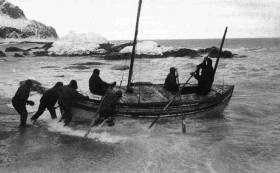Displaying items by tag: Lecture: Shackleton
Lecture: Ernest Shackleton's Story - A Hundred Years Later
#LectureShackleton -An illustrated lecture: "Ernest Shackleton's Story - A Hundred Years Later" by Kevin Kenny will take place on Thursday 12 January 2017 (20:00hrs) at the Poolbeg Yacht & Boat Club, Ringsend, Dublin 4. There will be an entry fee of €5 in aid of the RNLI.
100 years ago, Shackleton led one of the greatest ever feats of seafaring with a six person crew in a 22 foot open boat; it is even more astounding that half of the crew was Irish.
Kevin will tell Shackleton’s inspiring story, his family, his character, his expeditions, and his strong Irish connections. Bring warm clothes – we have to cross the Antarctic Circle five times!
About the Lecturer: As a teenager, Kevin Kenny bought a secondhand copy of Treasure Island, only to stumble across a pagemarker from Ernest Shackleton to Jacobs thanking them for supplying biscuits to his Nimrod expedition. Shackleton was the right person in the right place for Kevin, and has been a travelling companion since.
Shortly afterwards, Kevin became involved in an initiative in Athy Co. Kildare which was using Shackleton as a basis for building pride in local heritage. Since then, Athy has been to the fore in reclaiming Shackleton for Ireland. Shackleton’s character had lent itself to a wide range of projects, ranging from the internationally acclaimed Shackleton Autumn School to a transition year leadership/teamwork programme.
Kevin learned his sailing, and made many friends, through Glenans at Collanmore and Baltimore. Anyone with an interest in sailing cannot fail to be interested in the heroic age of exploration and the significant contribution made by Shackleton and other Irish players.





























































